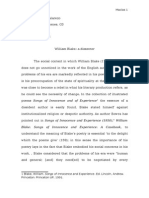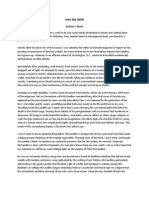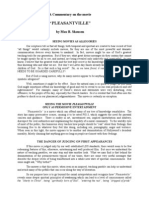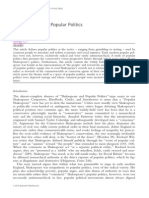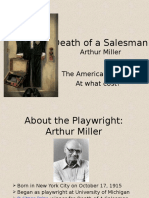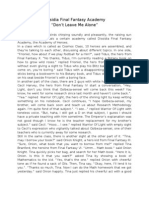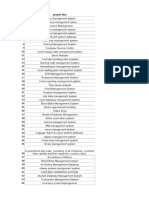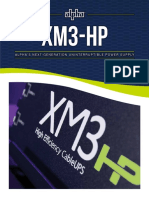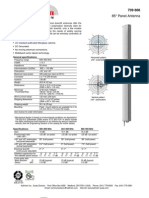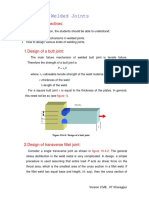Example Grade 9 Essay Power and Conflict-London. GCSE AQA: Atozstudying
Example Grade 9 Essay Power and Conflict-London. GCSE AQA: Atozstudying
Uploaded by
Omar ElmasryCopyright:
Available Formats
Example Grade 9 Essay Power and Conflict-London. GCSE AQA: Atozstudying
Example Grade 9 Essay Power and Conflict-London. GCSE AQA: Atozstudying
Uploaded by
Omar ElmasryOriginal Description:
Original Title
Copyright
Available Formats
Share this document
Did you find this document useful?
Is this content inappropriate?
Copyright:
Available Formats
Example Grade 9 Essay Power and Conflict-London. GCSE AQA: Atozstudying
Example Grade 9 Essay Power and Conflict-London. GCSE AQA: Atozstudying
Uploaded by
Omar ElmasryCopyright:
Available Formats
Example grade 9 essay power and
conflict- London. GCSE AQA
written by
atozstudying
www.stuvia.com
Downloaded by: omar21 | the21thomar@gmail.com
Distribution of this document is illegal
Stuvia.co.uk - The Marketplace for Revision Notes & Study Guides
London. ‘Power of humans’
Throughout both London and Ozymandias, a direct contrast between the lower class and upper class
is made as those with less power are exploited in society.
Immediately, in the beginning of London, the persona is ‘wander(ing) through each chartered street,
near where the chartered Thames does flow’. The verb: ‘wander’ creates a hopeless tone as he/she
is being controlled by powerful institutes. Furthermore, the adjective: ‘chartered’ illustrates how the
central powers in society control society and therefore the less powerful are exploited. This is
evident in the industrial revolution, where the poor were exploited by upper class members so Blake
wants to convey how the ‘power of humans’ is concentrated and therefore leads to exploitation
causing the readers to become enlightened about society’s corrupt ways.
Similarly, Ozymandias commences with the persona meeting ‘a traveller from an antique land’. This
makes the poem seem like a story, something enchanted and seemingly unreal due to how peculiar
it sounds therefore making Ozymandias’ existence and centralised power seem distant. Shelley may
possibly have done this in order to bring back the harshness Napoleon war as it seemed distant at
the time.
London also conveys lack ‘power of humans’ by how ‘the hapless soldier’s sigh runs in blood down
the palace walls’. The adjective: ‘hapless’ could possibly be portraying the soldiers as unfortunate
since they lack power and are being abused and used by monarchies as weapons for war.
Moreoever, the soldier’s may also be unfortunate due to the fact they are supporting the
monarchies subsequently in a revolution, it will be their blood that ‘runs… down palace walls’. This
could therefore be interpreted as a warning to the soldiers to rebel against the monarchy. Shelley
wanted England to follow the French Revolution and become communist so the ‘power of humans’
would be even.
Alternatively, in Ozymandias, the people in society have small rebellions against people who have
the most power. The synecdoche ‘the hand’ could mean the sculptor who ‘mocked’ Ozymandias and
ridiculed him through making the statue- his rebellion. Moreover, the metaphor ‘the heart that fed’
may, therefore, mean that the sculptor is using Ozymandias for his own benefit- to create art. This
illustrates the sculptor’s power since he can manipulate Ozymandias for his own benefit. Shelley,
arguably, does the same and uses Ozymandias to create his own art- his poem- so is also rebelling
against the central power.
The title: ‘London’ also explores the theme ‘power of humans’. To a modern reader, ‘London’ is a
free city however, Blake contrasts to this as he believes ‘London’ is extremely restrictive and
‘chartered’. The shock the modern reader will experience when discovering the truth regarding
London and the lack of power for humans may mimic the passion that Blake feels regarding the
capitalist society.
Similarly, the title: ‘Ozymandias’ also depicts the theme of ‘power of humans’ to an extent.
‘Ozymandias’ is a Greek translation of Ramesses II therefore Shelly is attempting to illustrate how
the power of humans is impermanent. Ozymandias’ legacy didn’t last, even his name didn’t last since
he is known as Ozymandias rather than Ramesses II, all that is left of him is a ‘colossal wreck’.
The structure of London also reflects the theme of ‘power of humans’. Blake discusses the reason for
the imbalance in power in stanza 3, where he discusses the ‘blackening church’ and the monarchy.
This was in the middle of the poem and therefore could perhaps be illustrating how the institutes
are the heart of all problems and are the main reasons and causes of imbalance in power.
Downloaded by: omar21 | the21thomar@gmail.com
Distribution of this document is illegal
Stuvia.co.uk - The Marketplace for Revision Notes & Study Guides
Ozymandias also utilises structure to show the ‘power of humans’. The volta of the poem is when
Ozymandias tells ‘ye mighty’ to ‘look on (his) works and despair’. Again, the impermanence of
human power is explored since Ozymandias’ work did not last although he thought it would. This is
ironic due to the fact Shelley believes his art and power will have an impact on generations to come
as well, if we take Ozymandias to represent Shelley and ‘ye mighty’ to represent Horace Smith.
Shelley and Horace Smith were rivals and both produced poems regarding Ozymandias, however
took alternate paths. Shelley believes his art to be permanent as he doesn’t understand the true
impermanence of human power.
In London, Blake has simplified the rhyme and the metre of the poem therefore it sounds like a
child’s speech. Children are depicted as vulnerable and lack power in society as their views are
always ignored. Blake may be implying that the poor in society are treated like children, their beliefs
are overlooked as they lack power.
Alternatively, in Ozymandias, Shelley utilises a sonnet form, which is usually used in poems regarding
love. This may have been used due to the fact that Shelley wants to illustrate how Ozymandias is
self-obsessed and believes everyone loves him and his legacy. This is contrasted by the fact that he
doesn’t understand the impermanence of human power and how his legacy will not/ has not lasted.
At the end of London, Blake becomes more passionate in the delivery of his message regarding how
the ‘power of humans’ should be distributed evenly. The oxymoron ‘marriage hearse’ could possibly
represent the relationship between people and the government since it should be equal and about
love, like a marriage, however, in the capitalist society of the time, the ‘marriage’ between the
government and the people wasn’t equal. The people were subservient to the government therefore
were exploited and in pain.
Equally, at the ending of Ozymandias, Shelley becomes more passionate regarding how the ‘power
of humans’ is temporary and all that will be left is a ‘colossal wreck’ The hyperbolic use of the
adjective ‘colossal’ may link to Ramasses II’s ego and how he believed himself to be powerful. This
contrasts with the noun ‘wreck’ which illustrates how, ultimately, your legacy and power will be
diminished. Shelley does this to re-enforce how the power of humans is temporary and so is
supporting the British army in the Napolean war as he could be conveying how nothing will be left of
Napolean.
Grade 8, to improve talk about form.
Downloaded by: omar21 | the21thomar@gmail.com
Distribution of this document is illegal
Powered by TCPDF (www.tcpdf.org)
You might also like
- AIC Characters & Themes QuotesDocument4 pagesAIC Characters & Themes Quotesr aNo ratings yet
- How Does Priestley Use Mrs Birling As A Symbol?Document6 pagesHow Does Priestley Use Mrs Birling As A Symbol?JesiTig0% (1)
- Carol Ann Duffy and Philip Larkin Critics QuotesDocument8 pagesCarol Ann Duffy and Philip Larkin Critics QuotesIlham YUSUFNo ratings yet
- Oetry Makes Something Strange Takes YOU Beyond THE OrdinaryDocument3 pagesOetry Makes Something Strange Takes YOU Beyond THE OrdinaryKhadija MeghrawiNo ratings yet
- A Study in PinkDocument2 pagesA Study in PinkMudassir PuriNo ratings yet
- Macbeth Is An Ancient Text That Has No Relevance or Parallels With Our Society Today.Document2 pagesMacbeth Is An Ancient Text That Has No Relevance or Parallels With Our Society Today.Anubhav PunethaNo ratings yet
- Explore PriestleyDocument4 pagesExplore Priestleytvesha.vinodNo ratings yet
- EVA SMITH From 'An Inspector Calls' GCSE EssayDocument2 pagesEVA SMITH From 'An Inspector Calls' GCSE EssayMischa RudlingNo ratings yet
- An Inspector CallsDocument39 pagesAn Inspector CallsjackNo ratings yet
- Jekyll and Hyde QuotesDocument7 pagesJekyll and Hyde Quotespty62ng7cpNo ratings yet
- AQA GCSE English LiteratureDocument18 pagesAQA GCSE English LiteratureFPS FailsNo ratings yet
- Literary Criticism: The Curious Incident of The Dog in The Night TimeDocument3 pagesLiterary Criticism: The Curious Incident of The Dog in The Night TimeMarc Joshua CadizNo ratings yet
- L'Aquila - Impacts and ManagementDocument6 pagesL'Aquila - Impacts and ManagementRichard HampsonNo ratings yet
- Realistic Drama PrintDocument13 pagesRealistic Drama PrintMuhammad AdekNo ratings yet
- Powerless Women EssayDocument2 pagesPowerless Women Essaylily ellisNo ratings yet
- Modern TranslationDocument18 pagesModern Translationmbee30% (1)
- HumansDocument2 pagesHumansMădălin Hîncu100% (1)
- J-SAW-2004-128 Mrs DallowayDocument16 pagesJ-SAW-2004-128 Mrs DallowaythereisnousernameNo ratings yet
- What Sorts of Transgression Can You Identify in A Midsummer NightDocument4 pagesWhat Sorts of Transgression Can You Identify in A Midsummer NightOnica Bogdan-GeorgianNo ratings yet
- The University of Edinburgh - WK1 FLASHBACKS AND FLASH-FORWARDSDocument2 pagesThe University of Edinburgh - WK1 FLASHBACKS AND FLASH-FORWARDSShanat Andrea OliverosNo ratings yet
- Mrs Dalloway and The Movie The HoursDocument4 pagesMrs Dalloway and The Movie The Hoursalinastiefel0% (1)
- Blood Brothers TECHNIQUES 1pcvrdbDocument6 pagesBlood Brothers TECHNIQUES 1pcvrdbDEJUNAE CAMPBELL100% (1)
- A Christmas Carol Revision GuideDocument11 pagesA Christmas Carol Revision Guidehedy 해디No ratings yet
- English Extension 1 - QtaDocument11 pagesEnglish Extension 1 - Qtaapi-269691881No ratings yet
- William Blake, A DissenterDocument7 pagesWilliam Blake, A DissenterMichelle Macías ValarezoNo ratings yet
- Shakepeare's Strong WomenDocument12 pagesShakepeare's Strong WomenSavvy WoodsNo ratings yet
- MM2021 Essay (14090421D) Lee Yat HeiDocument11 pagesMM2021 Essay (14090421D) Lee Yat HeiGenesis LeeNo ratings yet
- Author's NoteDocument2 pagesAuthor's NoteMr. BenincasaNo ratings yet
- Extremes of Gender and PowerDocument12 pagesExtremes of Gender and PowerMarianela SanchezNo ratings yet
- Key Macbeth Quotes - Scene by SceneDocument4 pagesKey Macbeth Quotes - Scene by SceneMariaNo ratings yet
- Commentary On The Movie 'Pleasantville'Document4 pagesCommentary On The Movie 'Pleasantville'Friends of Max SkousenNo ratings yet
- Eng Ext1 - Metropolis Quotes and AnalysisDocument2 pagesEng Ext1 - Metropolis Quotes and AnalysiskatNo ratings yet
- The Crucible: Context Ideas: Form Incorporating Ideas From The Text Examples From The Text: The CrucibleDocument1 pageThe Crucible: Context Ideas: Form Incorporating Ideas From The Text Examples From The Text: The Cruciblehiepdo95No ratings yet
- Jane Eyre MaterailsDocument15 pagesJane Eyre MaterailsMohammad Rahmatullah LikhonNo ratings yet
- Act 1 Quotes - MacbethDocument3 pagesAct 1 Quotes - MacbethNathan Nguyen100% (1)
- IndexDocument15 pagesIndexParohia VerdeaNo ratings yet
- ENG 426 Term Paper - Sadia AfrinDocument6 pagesENG 426 Term Paper - Sadia AfrinSadia AfrinNo ratings yet
- Shakepeare and Public PoliticsDocument13 pagesShakepeare and Public PoliticsthepowellNo ratings yet
- Overview and Key Scenes Handmaid's TaleDocument27 pagesOverview and Key Scenes Handmaid's Talerizam aliNo ratings yet
- BelongingDocument2 pagesBelongingforestdoll100% (1)
- Brave New World AnalysisDocument4 pagesBrave New World AnalysissincerelyysarahNo ratings yet
- Duffy V LarkinDocument5 pagesDuffy V Larkinapi-353984031No ratings yet
- Psychoanalytic Study of Alexander PopDocument3 pagesPsychoanalytic Study of Alexander PopFahadkhan KhanNo ratings yet
- SCND Vs Dolls House Pp2Document2 pagesSCND Vs Dolls House Pp2chaynika harivyasiNo ratings yet
- Death of A Salesman OverviewDocument28 pagesDeath of A Salesman OverviewmspatinoNo ratings yet
- Hamlet Essay OkDocument2 pagesHamlet Essay OkJimmy GuerreroNo ratings yet
- 9.2.23 Comparison EssayDocument4 pages9.2.23 Comparison EssayJennifer SprattNo ratings yet
- "Pleasantville" Case Study: FunctionalismDocument3 pages"Pleasantville" Case Study: FunctionalismAlanahNo ratings yet
- Essay Mod ADocument2 pagesEssay Mod AkevNo ratings yet
- Othello Through A Marxist LensDocument4 pagesOthello Through A Marxist Lensrush patelNo ratings yet
- As You Like ItDocument91 pagesAs You Like ItSauravNo ratings yet
- Redfern NowDocument3 pagesRedfern Nowwasaiyan100% (1)
- Representing OpheliaDocument5 pagesRepresenting OpheliajudurayNo ratings yet
- Alarm Paragraph Structure Model Pats CuriousDocument3 pagesAlarm Paragraph Structure Model Pats Curiousapi-331074548No ratings yet
- Essay 2Document8 pagesEssay 2api-4624051150% (1)
- Clym Yeobright's MistakeDocument2 pagesClym Yeobright's MistakeKainat MaheenNo ratings yet
- It - S Alive An Exploaration of Contemporary Poetry in The Digital Age by Lysle Hood PDFDocument53 pagesIt - S Alive An Exploaration of Contemporary Poetry in The Digital Age by Lysle Hood PDFAitor LázpitaNo ratings yet
- New World Order of Postmodernism in the Plays of Harold Pinter: Pause at PlayFrom EverandNew World Order of Postmodernism in the Plays of Harold Pinter: Pause at PlayNo ratings yet
- Dissidia Final Fantasy Academy: Squall Leonhart X Zidane TribalDocument14 pagesDissidia Final Fantasy Academy: Squall Leonhart X Zidane TribalJiji100% (2)
- CLIFFORD, J. and G. MARCUS. - Writing Culture. The Poetics and Politics of Ethnografy (Section) - FixDocument13 pagesCLIFFORD, J. and G. MARCUS. - Writing Culture. The Poetics and Politics of Ethnografy (Section) - FixNoseyo Netlabel100% (1)
- Purnomo Et Al 2024 Tctap C 189 A Difficult Strategy of Double Trouble Acute Limb Ischemia and Asymptomatic Severe IliacDocument2 pagesPurnomo Et Al 2024 Tctap C 189 A Difficult Strategy of Double Trouble Acute Limb Ischemia and Asymptomatic Severe IliacM. PurnomoNo ratings yet
- The Potential of Mountain Biking As An EcotourismDocument28 pagesThe Potential of Mountain Biking As An EcotourismPaolo MendioroNo ratings yet
- XS Sports Nutrilite Product GuideDocument8 pagesXS Sports Nutrilite Product Guideโยอันนา ยุนอา แคทเธอรีน เอี่ยมสุวรรณNo ratings yet
- Structure and Functions of Rbi: Download Ebook NowDocument6 pagesStructure and Functions of Rbi: Download Ebook NowDipanshu SinhaNo ratings yet
- Rex 3e Level 4 - Vocab List by UnitDocument12 pagesRex 3e Level 4 - Vocab List by UnitMichael ZenkNo ratings yet
- H Bridge Project ProposalDocument5 pagesH Bridge Project ProposalEngr Saad Bin SarfrazNo ratings yet
- Drug War - Course SyllabusDocument5 pagesDrug War - Course SyllabusRobert PattonNo ratings yet
- Research Bretz LeoncioDocument18 pagesResearch Bretz LeoncioLoren Marie Lemana AceboNo ratings yet
- Lesson 6 - Measures of LocationDocument14 pagesLesson 6 - Measures of Locationian92193No ratings yet
- PH Application Form030518Document9 pagesPH Application Form030518Tola11No ratings yet
- Session 2: Personal Professional Development: Pre-TestDocument9 pagesSession 2: Personal Professional Development: Pre-TestGly Pascual AsuncionNo ratings yet
- Dbms Project IdeaDocument2 pagesDbms Project IdeaSubham RayNo ratings yet
- Alpha'S Next-Generation Uninterruptible Power Supply: With Handle: 7.8 X 16.7 X 10.7 / 198.1 X 424.18 X 271.8Document6 pagesAlpha'S Next-Generation Uninterruptible Power Supply: With Handle: 7.8 X 16.7 X 10.7 / 198.1 X 424.18 X 271.8federicosanchezNo ratings yet
- Vap Care Bundle FinalDocument4 pagesVap Care Bundle FinalMother of Mercy Hospital -Tacloban Inc.No ratings yet
- BalanceadoraDocument9 pagesBalanceadoracristhunneNo ratings yet
- 85° Panel Antenna: General SpecificationsDocument2 pages85° Panel Antenna: General SpecificationsBonar SianiparNo ratings yet
- Putty CheckheetDocument7 pagesPutty CheckheetsujatananasoNo ratings yet
- Bestec Oil InterceptorsDocument83 pagesBestec Oil InterceptorsparthivNo ratings yet
- Mil STD 462 PDFDocument80 pagesMil STD 462 PDFdvanupkle100% (1)
- Rudy Wong, Investment AdvisorDocument9 pagesRudy Wong, Investment AdvisorRikhabh DasNo ratings yet
- Copybook LengthDocument9 pagesCopybook LengthRamakant SamalNo ratings yet
- Lenovo K5: Quick Start GuideDocument15 pagesLenovo K5: Quick Start GuideRajadeepan GeorgeNo ratings yet
- WSQ Perform Electrical Terminations and Connections - 18-21 Dec 17 SingaporeDocument1 pageWSQ Perform Electrical Terminations and Connections - 18-21 Dec 17 SingaporeAnonymous C9ZNFkrb6No ratings yet
- New Lesson 2Document69 pagesNew Lesson 2King charles jelord Cos-agonNo ratings yet
- De Blasio Section 8 Policy BriefDocument9 pagesDe Blasio Section 8 Policy BriefBill de BlasioNo ratings yet
- Design of Welded JointsDocument7 pagesDesign of Welded JointsmohammadNo ratings yet
- Solute Solvent Interaction Studies of Amino Acids in Aqueous Tertiary-Butyl Alcohol SolutionsDocument6 pagesSolute Solvent Interaction Studies of Amino Acids in Aqueous Tertiary-Butyl Alcohol SolutionsNag28rajNo ratings yet
- Translate - Google SearchDocument1 pageTranslate - Google SearchEmilija KalinauskaiteNo ratings yet

























